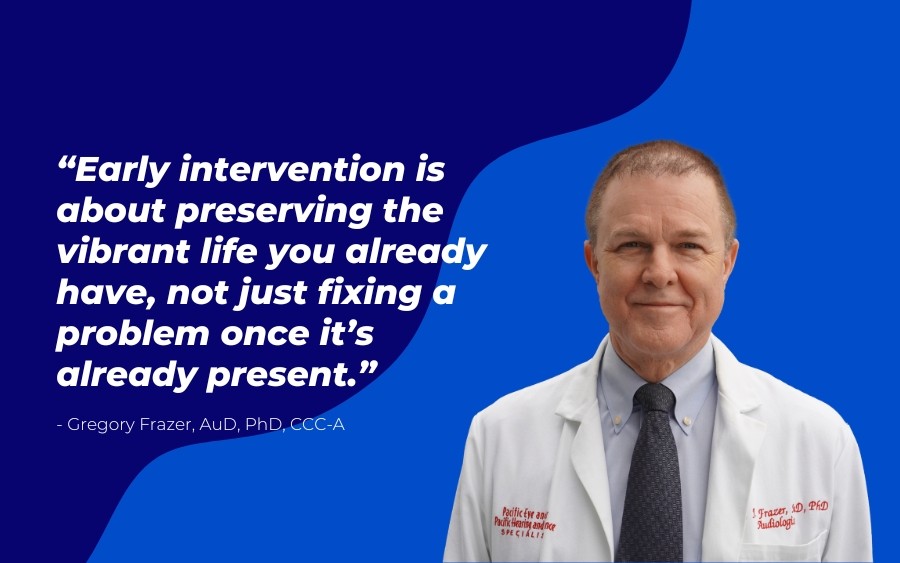Want to Reduce Your Risk of Dementia? Get Your Hearing Checked Today

|
Gregory Frazer
|
Aug 28, 2024

As we age, the importance of maintaining our hearing health becomes increasingly clear—not just for the sake of communication but also for our overall cognitive well-being.
A recent study published in the Journal of the American Medical Association (JAMA) has brought to light a crucial link between hearing loss and dementia, revealing that taking care of your hearing can significantly reduce your risk of developing dementia.
The Connection Between Hearing Loss and Dementia
Hearing loss is more common than many people realize. In fact, an estimated 23 percent of Americans aged 12 and older experience some level of hearing loss, with the prevalence increasing significantly in older adults. For those aged 80 and above, moderate to severe hearing loss is more common than mild hearing loss. But hearing loss doesn't just make conversations more challenging—it also has a profound impact on brain health.
The JAMA study, which focused on adults aged 70 and older, found a startling connection between hearing loss and dementia. Participants with moderate to severe hearing loss were found to be at a much higher risk of developing dementia compared to those with normal hearing.
Specifically, while only 6 percent of participants with normal hearing developed dementia, that number jumped to 17 percent among those with moderate to severe hearing loss.
This significant increase in risk underscores the importance of addressing hearing loss as early as possible. But why does hearing loss increase the risk of dementia?
How Hearing Loss Contributes to Cognitive Decline
The connection between hearing loss and dementia is thought to stem from reduced brain stimulation. When we experience hearing loss, our brains receive less auditory input, which can lead to cognitive decline over time.
Moreover, individuals with hearing loss may be less likely to engage in social activities due to difficulty hearing, embarrassment, or frustration. Social interaction is a key way to stimulate the brain, and a lack of it can accelerate cognitive decline.
This new research also emphasizes that hearing aids can play a crucial role in mitigating this risk. By restoring auditory input and making social activities more accessible, hearing aids help keep the brain engaged and active, thus reducing the risk of dementia.
What You Can Do to Protect Your Brain Health
If you're experiencing hearing loss, it's important to take action to protect your cognitive health. Here are some steps you can take:
If you suspect you have hearing loss, schedule a hearing test with a professional audiologist. Early detection is key to preventing further decline.
If you already have hearing aids, make sure you're using them consistently. If you don't have them yet, consider getting fitted for hearing aids. Over-the-counter options are available for those with mild to moderate hearing loss, but keep in mind that 58 percent of these devices are returned or not used.
This is why, in a nationwide survey, 93.82 percent of people reported that it was very important (33.50 percent) or absolutely important (60.32 percent) to have a hearing care professional select, fit, and program hearing devices.
Market Trak 9 data also indicates that 85 percent of hearing aid users with devices that are four years old or newer are satisfied with their devices, and 90 percent of these owners are satisfied with the professional care they received.
For more severe cases, professional guidance is highly recommended to ensure the best results and satisfaction with your hearing aids.
Engage in social activities and maintain an active lifestyle. Even with hearing loss, it's important to participate in events and activities that keep your brain stimulated.
Proper ear hygiene is crucial. If you're unsure how to clean your ears safely, consult your doctor for advice.
If your hearing aids aren't functioning properly, get them checked and repaired as soon as possible. Ensuring they work correctly is essential for maintaining your auditory input.
Don't Wait—Take Charge of Your Hearing Health
The evidence is clear: hearing loss not only impacts your ability to communicate but also plays a significant role in your cognitive health. By addressing hearing loss early and using hearing aids, you can help reduce your risk of dementia and enjoy a more connected and fulfilling life.
Pacific Hearing Inc is here to help you take the first step toward better hearing and better brain health. Whether you're due for a hearing test, need new hearing aids, or require service for your existing devices, we're ready to assist you.
Ready to Protect Your Cognitive Health?
Schedule your hearing test today and take a proactive step in reducing your risk of dementia. Contact us at Pacific Hearing Inc to book an appointment and learn more about how we can support your hearing health.
















